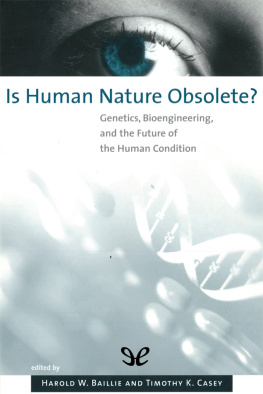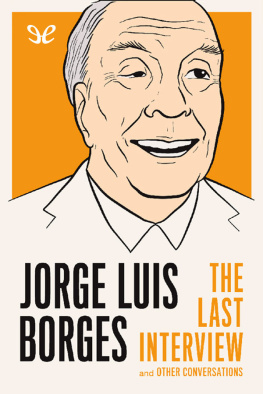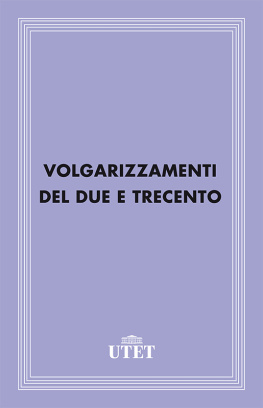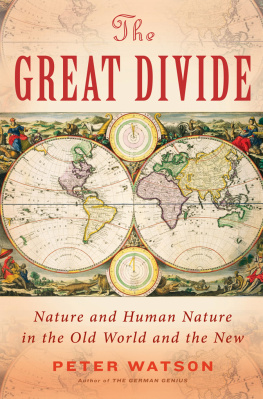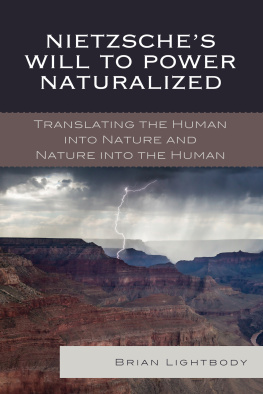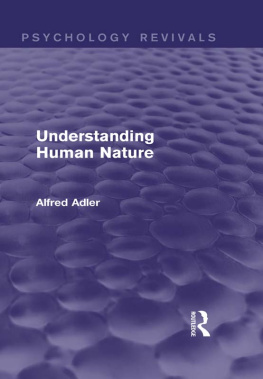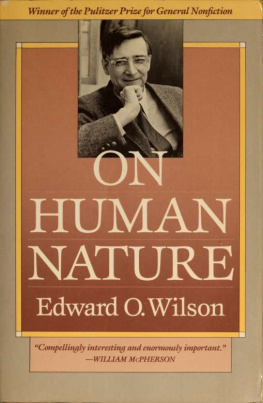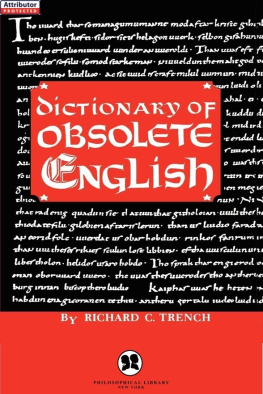AA. VV. - Is Human Nature Obsolete?
Here you can read online AA. VV. - Is Human Nature Obsolete? full text of the book (entire story) in english for free. Download pdf and epub, get meaning, cover and reviews about this ebook. year: 2005, publisher: ePubLibre, genre: Romance novel. Description of the work, (preface) as well as reviews are available. Best literature library LitArk.com created for fans of good reading and offers a wide selection of genres:
Romance novel
Science fiction
Adventure
Detective
Science
History
Home and family
Prose
Art
Politics
Computer
Non-fiction
Religion
Business
Children
Humor
Choose a favorite category and find really read worthwhile books. Enjoy immersion in the world of imagination, feel the emotions of the characters or learn something new for yourself, make an fascinating discovery.
- Book:Is Human Nature Obsolete?
- Author:
- Publisher:ePubLibre
- Genre:
- Year:2005
- Rating:3 / 5
- Favourites:Add to favourites
- Your mark:
- 60
- 1
- 2
- 3
- 4
- 5
Is Human Nature Obsolete?: summary, description and annotation
We offer to read an annotation, description, summary or preface (depends on what the author of the book "Is Human Nature Obsolete?" wrote himself). If you haven't found the necessary information about the book — write in the comments, we will try to find it.
AA. VV.: author's other books
Who wrote Is Human Nature Obsolete?? Find out the surname, the name of the author of the book and a list of all author's works by series.
Is Human Nature Obsolete? — read online for free the complete book (whole text) full work
Below is the text of the book, divided by pages. System saving the place of the last page read, allows you to conveniently read the book "Is Human Nature Obsolete?" online for free, without having to search again every time where you left off. Put a bookmark, and you can go to the page where you finished reading at any time.
Font size:
Interval:
Bookmark:

As our scientific and technical abilities expand at breathtaking speeds, concern that modern genetics and bioengineering are leading us to a posthuman future is growing. Is Human Nature Obsolete? poses the overarching question of what it is to be human against the background of these current advances in biotechnology, its perspective is philosophical and interdisciplinary rather than technical; the focus is on questions of fundamental ontological importance rather than the specifics of medical or scientific practice.
The authorsall distinguished scholars in their fieldstake on questions about technologys goals and values that are often ignored or sidelined in the face of rapid scientific advances and the highly specialized nature of technical knowledge. Is Human Nature Obsolete? provides a humanistic overview of a subject too often considered only in its technological aspect.
Modifying ourselves through molecular biology is a humanitarian utopia to some, an imminent nightmare to others. But to all, the prospect should be a challenge because It touches on so many bask and unresolved questions. This excellent, probing collection of papersspanning philosophy, history, social science, and theologywill be welcomed by professionals and lay readers alike.
Edward Tenner, author of Why Things Bite Back: Technology and the Revenge of Unintended Consequences and Our Own Devices: How Technology Remakes Humanity
The conversation about what we wantliterallyto make of ourselves is probably the most important conversation human beings will ever have. This carefully considered book is a fine entry into that dialogue, and it comes not a moment too soon.
Bill McKibben, author of Enough: Staying Human in an Engineered Age
The greatest strength of this book is the philosophical ambition of many of the essays, which make use of a rich variety of thought and literature to explore the implications of the new genetics and new biology. The book draws interesting and unpredictable connections between large human themes and contemporary debates. Particular essays in the volume will have lasting value in the field and are deeply relevant to the current bioethical deliberations at the national level.
Eric Cohen, Ethics and Public Policy Center, Washington, D.C.
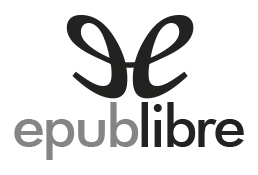
AA. VV.
Genetics, Bioengineering, and the future of the Human Condition
ePub r1.0
Titivillus 19.08.16
Original title: Is Human Nature Obsolete?
AA. VV., 2005
Digital editor: Titivillus
ePub base r1.2

Without our contributing authors, this volume would simply not exist. Their willingness to take the risk of joining the original conference and their commitment to the exchange of ideas that gave rise to the final versions of their chapters, places them first on our list of those to be acknowledged and thanked. The conference and the work on this volume were supported by a subgrant from the Northeast Regional Cancer Institute, which had received support from a U.S. Department of Energy Grant, DE-FG02-98ER62592. We wish to thank the Northeast Regional Cancer Institute, its then president, Susan Belin, and the chair of its board of directors, Dr. Harmar Brereton, for giving us the opportunity to gather together these scholars. We would also like to thank our colleagues Professors William Rowe and Charles Pinches, directors of the Center for Ethics Studies at the University of Scranton, for their encouragement and suggestions for our efforts. Clay Morgan, senior acquisitions editor at the MIT Press, was a constant source of advice and direction. Eleanore Harrington provided tireless secretarial support and good humor, which kept us going when the task seemed endless. And at the last minute, our colleague Crina Geschwandtner added crucial editorial support.
Thomas A. Shannons essay is excerpted from The New Genetic Medicine: Theological and Ethical Reflections (2003), by Thomas A. Shannon and James J. Walter. Reprinted with the permission of Sheed and Ward, an imprint of Rowman and Littlefield Publishers.
Paul Rabinows essay is excerpted from Anthropos Today: Reflections on Modern Equipment (2003), by Paul Rabinow. Reprinted with the permission of Princeton University Press.
Robert N. Proctors essay is reprinted from Current Anthropology (44.2, April 2003), with the permission of the author.
Introduction
Harold W. Baillie and Timothy K. Casey
Ours is the age of technology. What this means exactly has for some time now been the subject of intense debate that spans the entire spectrum of opinion from Luddism to the most unabashed technophilia. Technology, in one form or another, has always been a significant element of the human condition, but never has it been so ubiquitous and determinative of who and what we think we are. Cyborgs, artificial intelligence, cloning, and genetic engineeringall are indicative of a swiftly moving reality we struggle to make sense of in the absence of traditional signposts and historical precedents. What distinguishes modern technology from all other types, both premodern and non-Western, is its exclusive focus on the perfection of technical procedures and processes that had historically been subordinate to supratechnical norms and standards, usually of a moral, political, and religious nature. The underlying assumption in this revolutionary shift in orientation is the radical separation of technical and humanistic concerns. This divorce expresses itself in the widely held belief that technology is a neutral tool whose internal operations fall under a kind of immunity from the judgmental gaze of ethicists and metaphysicians, reducing their role, with few exceptions, to commentary on what is essentially a fait accompli. Environmental and medical ethics in particular rarely, if ever, get to question ongoing scientific research and its technological applications, but instead have been limited to reacting to discoveries and products and their possible ramifications on the natural and human worlds.
The power and unpredictability of modern technology outstrip traditional ways of thinking and judging at every turn. The reasons for this novel situation are too many and complex to be examined here, but a few remarks are in order to shed light on the problems presented by bioengineering and genetic research. The most obvious difficulty we face is the degree of specialization now characteristic of the pursuit of scientific and technological knowledge that when coupled with the rapidity with which this knowledge is developed and disseminated, makes it extremely difficult to construct the kind of overview necessary for effective assessment and evaluation. In addition, the calculative kind of thinking employed in the constant improvement and refinement of methodology and technique simply does not lend itself tothough it does not necessarily precludea reflective or self-critical turn of mind. When the focus is on results and cost-benefit analyses, it would be naive, perhaps even otherworldly, to expect technicians and scientists to think like traditional humanists. All of which tells us that there exists a culture that has grown up around a class of intellectual elites whose progressive mores, values, and goals go unquestioned, if they are considered at all. The best description of this culture remains Francis Bacons visionary
Font size:
Interval:
Bookmark:
Similar books «Is Human Nature Obsolete?»
Look at similar books to Is Human Nature Obsolete?. We have selected literature similar in name and meaning in the hope of providing readers with more options to find new, interesting, not yet read works.
Discussion, reviews of the book Is Human Nature Obsolete? and just readers' own opinions. Leave your comments, write what you think about the work, its meaning or the main characters. Specify what exactly you liked and what you didn't like, and why you think so.

